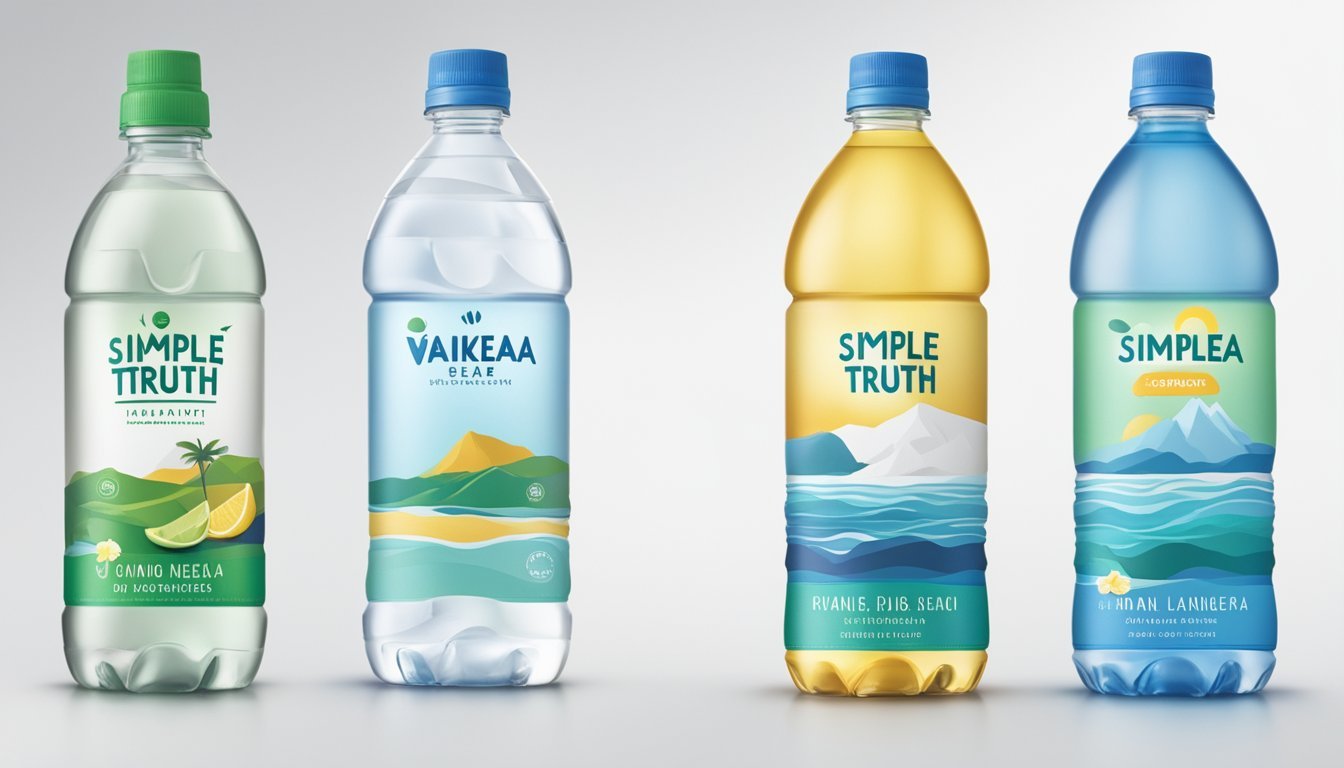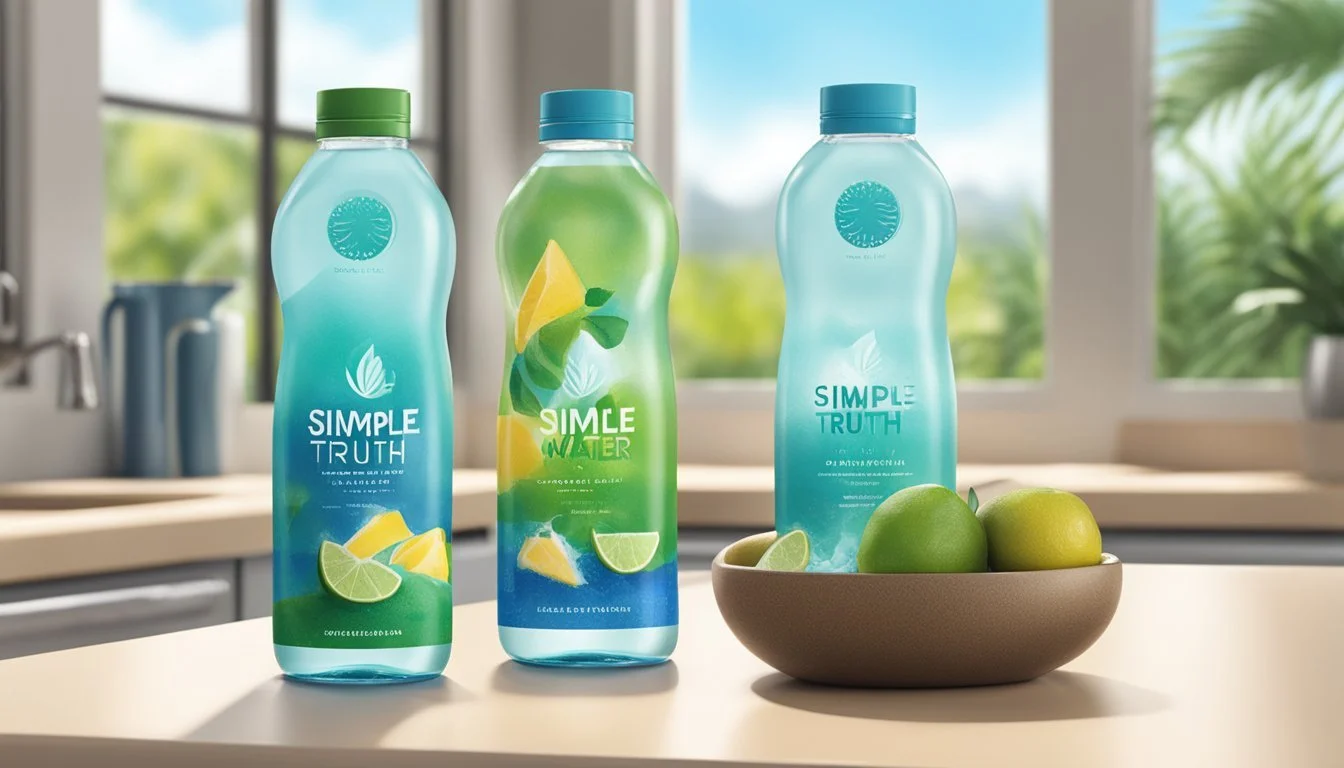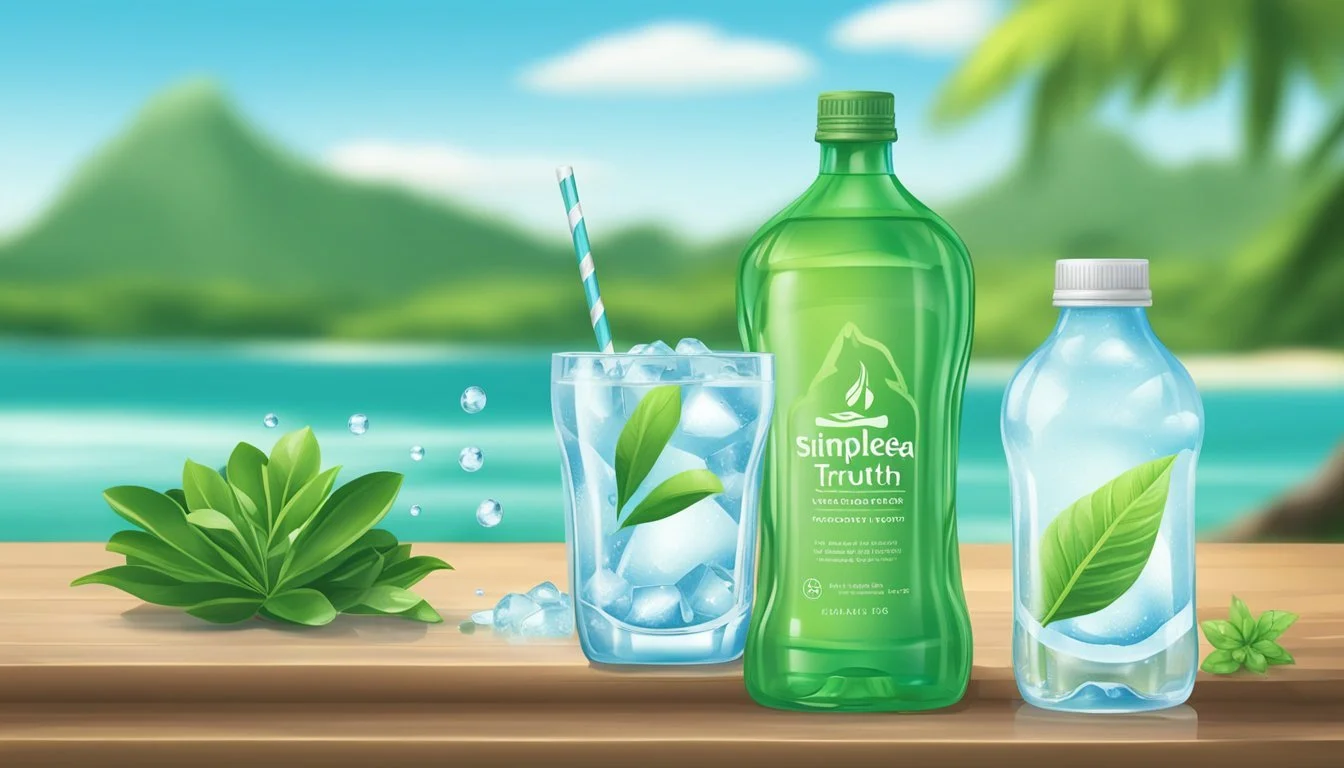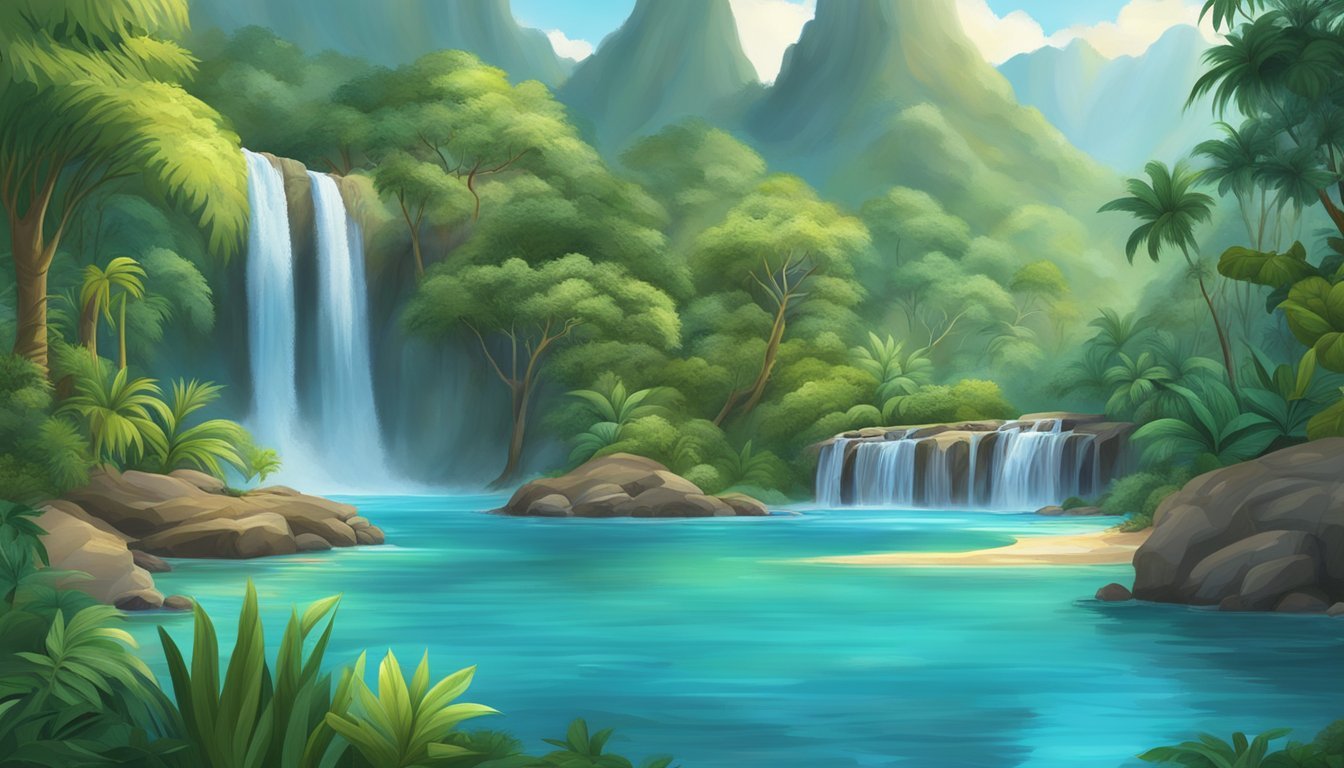Waiakea vs. Simple Truth
Comparing Premium Bottled Water Brands
The debate between Waiakea and Simple Truth bottled water often comes down to factors like source, sustainability, and health benefits. When comparing these two brands, Waiakea's water, sourced from the volcanic slopes of Hawaii, stands out for its natural alkalinity and mineral content. This unique origin not only enhances the taste but also offers potential health benefits owing to the minerals absorbed through volcanic rock.
Simple Truth, on the other hand, is marketed as part of a more affordable, readily available line of bottled water options. While Waiakea invests heavily in sustainability and renewable energy, making it appealing to eco-conscious consumers, Simple Truth focuses on providing clean and safe drinking water with easy accessibility.
By examining the specific attributes of each brand, the differences become clear. Waiakea captures the interest of those seeking a premium, environmentally-friendly choice. Simple Truth appeals to individuals looking for a practical, everyday drinking water solution. The ultimate decision lies in what factors are most important to the consumer.
The Rise of Bottled Water
Over the past few decades, bottled water has surged in popularity, driven by health-conscious consumers and the promise of purity. Examining market presence and consumer choices reveals the dynamics that contribute to its widespread consumption.
Market Presence and Consumer Choice
Bottled water brands have significantly increased their market presence globally. Sales data indicates growth from 2010 to 2020, with the industry expanding by 73%. This growth is notable in regions where clean tap water is easily accessible, highlighting consumer preferences for convenience and perceived purity.
Health-conscious consumers often favor bottled water due to concerns about contaminants in municipal water supplies. Marketing campaigns emphasize the purity, mineral content, and source of the water, influencing consumer decisions.
Availability in various packaging sizes, from small bottles to large gallon containers, further broadens market reach. This flexibility caters to diverse needs, from individual hydration to family consumption.
Understanding the Basics of Bottled Waters
Bottled waters vary significantly based on their source, mineral content, and filtration processes. Categories include spring water, mineral water, and purified water.
Spring water comes from natural springs and is often marketed for its natural purity. Mineral water contains minerals such as calcium and magnesium, which are claimed to offer health benefits. Purified water goes through various filtration processes, such as reverse osmosis, to ensure contaminants are removed.
Understanding these differences helps consumers make informed choices based on personal preferences and health considerations. Detailed labeling on bottles offers transparency about the water's source and mineral content, aiding in educated consumer decisions.
By examining these factors, individuals can better navigate the myriad options available in the bottled water market.
Healthy Hydration: Beyond Just Quenching Thirst
Healthy hydration involves more than simply drinking water. It includes understanding the nutrients and properties of the water, such as minerals and pH levels, and the health effects of proper hydration.
Minerals and Health Benefits
Waiakea and Simple Truth bottled waters contain essential minerals. Calcium, magnesium, and potassium are vital for bone health and muscle function. Waiakea water boasts higher levels of these minerals due to its volcanic filtration, contributing positively to overall health.
Simple Truth water also provides these minerals but in different proportions. Mineral intake from drinking water can support bone health, regulate muscle contractions and maintain essential electrolytes balance in the body.
pH Levels and Alkalinity
Waiakea water is known for its naturally alkaline pH, which is around 8.8. This higher pH level helps neutralize acidity in the body, potentially aiding digestion and reducing acid reflux. Alkaline water's role in maintaining the body's pH can contribute to overall metabolic health.
Simple Truth water generally has a neutral pH closer to 7. While it is still effective for hydration, it does not offer the same alkaline benefits as Waiakea. Understanding the importance of pH levels can help consumers choose the right water based on their health needs.
Importance of Hydration
Proper hydration is crucial for maintaining optimal health. It supports bodily functions such as nutrient transportation, temperature regulation, and joint lubrication. Consuming water with adequate minerals ensures that the body remains properly hydrated and maintains essential physiological functions.
Hydration also aids in cognitive function and physical performance. Both Waiakea and Simple Truth waters provide hydration, but Waiakea’s mineral content can offer additional health benefits. Making informed choices about hydration can enhance both immediate and long-term health outcomes.
Sourcing Water: Springs, Volcanoes, and Filtration
The origin of bottled water can have a significant impact on its taste and mineral content. This section highlights the various sources and purification processes of Waiakea and Simple Truth bottled waters.
Hawaiian Volcanic Water and Mauna Loa Volcano
Waiakea sources its water from the Mauna Loa volcano in Hawaii. This volcanic water is naturally filtered through thousands of feet of porous volcanic rock. The volcanic filtration process enriches the water with minerals and gives it an alkaline pH ranging between 7.6 and 8.5. This natural filtration contrasts with more industrial processes, making Waiakea water unique in composition and taste.
Spring Water Versus Purified Water
Spring water is collected from natural springs, deriving its purity from an underground source. Simple Truth bottled water often falls into this category, claiming natural filtration through the earth. In contrast, purified water undergoes treatment to remove contaminants. Processes like reverse osmosis and ionization are common in producing purified water. The choice between spring and purified water hinges on the consumer’s preference for natural versus thoroughly treated water.
Filtration and Purification Processes
Filtration and purification significantly affect the quality of bottled water. Waiakea's water filters naturally through volcanic rock, adding minerals and electrolytes. Purified water, such as that from Simple Truth, often undergoes multiple stages of processing like reverse osmosis, filtration, and ionization. These processes ensure high purity but can also strip water of its natural minerals. Understanding these methods helps consumers make informed choices based on their mineral preferences and purity needs.
Chemical Composition and Water Purity
When comparing Waiakea and Simple Truth bottled water, it is essential to consider the chemical composition and purity of the water. Factors such as natural alkalinity, testing for contaminants, and potential health risks from contaminants like PFAs and heavy metals are critical.
Naturally Alkaline Versus Ionized
Waiakea water is naturally alkaline, with a pH level around 8.2, due to its source from volcanic rocks in Hawaii. This natural alkalinity results from the water passing through mineral-rich rocks. Simple Truth, on the other hand, is often ionized to achieve alkalinity, which involves adding or removing ions to alter the pH level artificially. Natural alkalinity may provide more consistent health benefits through essential minerals like calcium, magnesium, and silica. Ionized water aims to achieve similar benefits but may vary in stability and purity.
Testing for Contaminants and Minerals
Waiakea boasts rigorous testing for contaminants and a comprehensive mineral profile. This testing ensures the absence of harmful substances such as lead, arsenic, and mercury. The volcanic filtration process enriches Waiakea with minerals. Simple Truth water undergoes standard purity tests, focusing on eliminating contaminants through filtration and ionization processes. Labels and official reports from both brands highlight their commitment to maintaining high mineral quality and purity levels.
Health Risks of PFAs and Heavy Metals
PFAs chemicals are a growing concern in bottled water, with potential long-term health risks. Waiakea has consistently tested low for PFAs, adhering to strict standards. Heavy metals like lead, arsenic, and mercury are also absent or in negligible amounts due to natural filtering. In contrast, Simple Truth's ionization and filtration processes aim to eliminate such contaminants but may not be as naturally efficient. Consumers must check lab reports and certifications to ensure their chosen brand is free from harmful PFAs and heavy metals.
Cultural and Environmental Dimensions
Waiakea and Simple Truth both claim to prioritize sustainability and ethical practices, but they differ significantly in their approaches and brand heritage. These dimensions are crucial for conscious consumers looking to make environmentally responsible choices.
Sustainability and Environmental Practices
Waiakea has positioned itself as a leader in sustainable practices. The brand is the first in the U.S. to be certified Carbon Neutral. Its water is naturally alkaline and sourced from the Mauna Loa volcano, emphasizing minimal environmental impact. Waiakea also donates a portion of its revenues to non-profits focused on the environment.
Simple Truth, a brand under the Kroger Company, offers water that is also marketed as sustainable. Their bottles are made from rPET (recycled polyethylene terephthalate) and are BPA-free. This focus reduces plastic waste by promoting recyclability, but the company does not hold a Carbon Neutral certification like Waiakea.
Ethical Considerations and Brand Heritage
Waiakea's ethical considerations include a blend of Hawaiian heritage and social responsibility. The brand donates over 5% of its revenue to nonprofits in Hawaii and worldwide, embedding philanthropy into its core business model. This dedication to social causes aligns with Hawaiian cultural values of malama (caring for the land and people).
Simple Truth leverages its position under the Kroger umbrella to promote ethical sourcing and fair business practices. While it adheres to ethical standards, it does not have a distinct cultural heritage that it draws from, unlike Waiakea. Its ethical initiatives are primarily tied to corporate social responsibility programs within a larger retail framework.
Impact of Plastic and Packaging Innovation
Waiakea uses 100% rPET for its bottles, significantly lowering plastic waste and contributing to a circular economy. Their packaging innovation also includes eco-friendly bottle designs that are lighter, reducing the carbon footprint associated with transportation. This focus has made Waiakea a standout in sustainable packaging.
Simple Truth also embraces rPET for its bottled water, ensuring that its products are recyclable. However, the brand does not push the envelope as much as Waiakea in terms of additional innovations like weight reduction or advanced bottle designs. Simple Truth's primary strength lies in its broader market accessibility and consistent use of BPA-free materials.
Consumer Experience: Taste, Convenience, and Lifestyle
Consumer preferences for bottled water often hinge on taste, convenience, and lifestyle alignment. Exploring these factors will help determine whether Waiakea or Simple Truth better suits individual needs.
Water Taste Profiles and Aftertaste
Waiakea water originates from the volcanic rocks of Hawaii, imparting a slightly alkaline, crisp, and refreshing taste. This unique mineral composition gives it a distinctive flavor, often described as clean and smooth with a subtle hint of sweetness.
Simple Truth, on the other hand, offers a neutral taste profile more reminiscent of purified tap water. The absence of any strong aftertaste makes it a popular choice for those who prefer a more subdued drinking experience.
Accessibility and Availability
Waiakea is available in various retail locations but may not be as widespread as mainstream brands. Its premium positioning means it may not be easily found in every grocery store or convenience shop. However, it is widely available online with options for bulk purchasing.
Simple Truth, a Kroger brand, benefits from the extensive network of Kroger stores. This ensures widespread availability and consistent stock. Consumers shopping for accessible bottled water on routine grocery trips may find Simple Truth more convenient to purchase.
Lifestyle Alignment and Convenience
Waiakea promotes itself as a sustainable and eco-friendly choice, appealing to consumers dedicated to environmentally conscious lifestyles. Bottled in sustainable packaging with a focus on social responsibility, Waiakea aligns well with those who prioritize ethical consumption.
Simple Truth, part of Kroger’s organic and natural product line, resonates with consumers seeking healthier, more natural choices within an affordable price range. It caters to everyday convenience, fitting seamlessly into the routines of individuals who prefer a balance between cost and quality.
Brand Comparison: Waiakea vs. Simple Truth
Waiakea and Simple Truth are distinct in their product range, price point, and brand reputation. This section will explore these factors comprehensively.
Product Range and Varieties
Waiakea: Waiakea water is sourced from a volcanic well in Hawaii, giving it naturally alkaline properties with a pH range of 7.6 to 8.2. Their product line primarily includes bottled volcanic water, marketed for its unique electrolyte and mineral composition. Waiakea also offers packaging options such as various bottle sizes and eco-friendly materials.
Simple Truth: Simple Truth is a private label brand focusing on offering natural and organic products. Their bottled water options extend to purified water, spring water, and alkaline water, with less emphasis on source-specific characteristics. The variety is broad, but it doesn’t highlight unique mineral compositions or extra health benefits like Waiakea.
Price and Affordability
Waiakea: Waiakea tends to be positioned as a premium product, reflected in its higher price point. This is justified through its unique sourcing, alkaline properties, and eco-friendly packaging. Customers seeking these specific qualities may find value in the higher cost.
Simple Truth: Simple Truth bottles are generally more affordable, appealing to budget-conscious consumers. The brand aims to offer accessible natural and organic options without the premium pricing seen with Waiakea. This makes it an attractive choice for those prioritizing cost over additional product features.
Brand Reputation and Quality Standards
Waiakea: Waiakea has built a strong brand identity around sustainability and health benefits. The company maintains rigorous quality standards, ensuring that the water retains its natural properties from source to bottle. Their commitment to the environment and community support initiatives further strengthens their reputation.
Simple Truth: Simple Truth is known for providing reliable, natural products. As part of a larger organic and natural product line under Kroger, Simple Truth adheres to strict quality standards. While possibly lacking the distinct market narrative of Waiakea, its broad availability and consistency are well-regarded.
Waiakea distinguished itself through specific geographical sourcing and a focus on sustainability. Simple Truth, meanwhile, emphasizes broader accessibility and affordability across a range of natural products. These comparisons provide a detailed snapshot of their differences, helping consumers make informed choices.
Conclusion
The choice between Waiakea and Simple Truth bottled water largely depends on personal preferences and priorities.
Health Benefits:
Waiakea: Naturally alkaline with mineral-rich content, offering potential health advantages.
Simple Truth: Claims to provide purified water but lacks the natural minerals found in Waiakea.
Sustainability:
Waiakea: Utilizes 100% renewable energy and high-grade, 100% recycled plastic for its bottles, enhancing its environmental appeal.
Simple Truth: Marketed as a more eco-friendly option in general grocery brands, details on specific sustainability practices are less pronounced.
Ethical Considerations:
Waiakea: Promotes ethical practices, including sustainable sourcing from volcanic springs and contributing a portion of profits to clean water initiatives.
Simple Truth: Part of a diverse range dedicated to affordable, transparent sourcing but lacks specific philanthropic initiatives attached to its bottled water.
When choosing between Waiakea and Simple Truth, it boils down to what factors matter most: natural health benefits, sustainability, ethical practices, or personal taste preferences. Each brand offers unique advantages that cater to different consumer values.
More About Waiakea
Icelandic Glacial vs Waiakea: Which Bottled Water is Better?
Mountain Valley Spring Water vs Waiakea: Which Bottled Water is Better?
Waiakea vs Kirkland Signature: Which Bottled Water is Better?
Waiakea vs Richard's Rainwater: Which Bottled Water is Better?
Waiakea vs Whole Foods Italian Still Mineral water: Which Bottled Water is Better?
More About Simple Truth
Aqua Carpatica vs Simple Truth: Which Bottled Water is Better?
Cascade Mountain vs Simple Truth: Which Bottled Water is Better?
Core Hydration vs Simple Truth: Which Bottled Water is Better?
Crystal Geyser vs Simple Truth: Which Bottled Water is Better?
Hawaii Volcanic vs Simple Truth: Which Bottled Water is Better?
Hawaiian Springs vs Simple Truth: Which Bottled Water is Better?
Ice Mountain vs Simple Truth: Which Bottled Water is Better?
Icelandic Glacial vs Simple Truth: Which Bottled Water is Better?
Liquid Death vs Simple Truth: Which Bottled Water is Better?
Mountain Valley Spring Water vs Simple Truth: Which Bottled Water is Better?
Nestle Pure Life vs Simple Truth: Which Bottled Water is Better?
Poland Spring vs Simple Truth: Which Bottled Water is Better?
Purely Sedona vs Simple Truth: Which Bottled Water is Better?
Richard's Rainwater vs Simple Truth: Which Bottled Water is Better?
San Pellegrino vs Simple Truth: Which Bottled Water is Better?
Simple Truth vs Crystal Lake: Which Bottled Water is Better?
Simple Truth vs Essence pH10: Which Bottled Water is Better?
Simple Truth vs Kirkland Signature: Which Bottled Water is Better?
Simple Truth vs Proud Source: Which Bottled Water is Better?
Simple Truth vs Talking Rain AQA: Which Bottled Water is Better?
Simple Truth vs Whole Foods 365: Which Bottled Water is Better?
Solan de Cabras vs Simple Truth: Which Bottled Water is Better?
Whole Foods Italian Still Mineral water vs Simple Truth: Which Bottled Water is Better?






